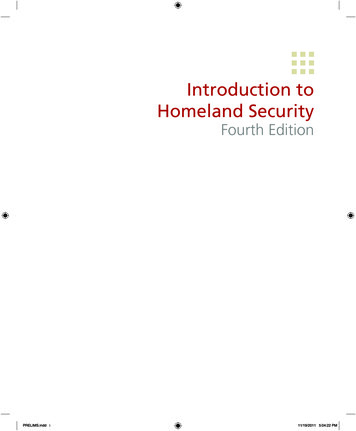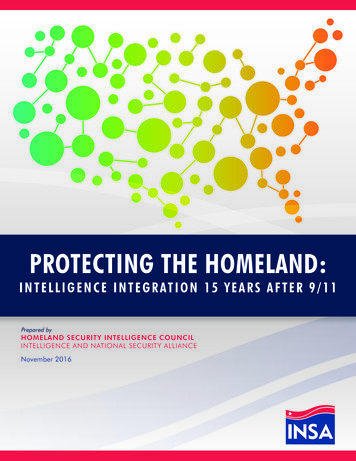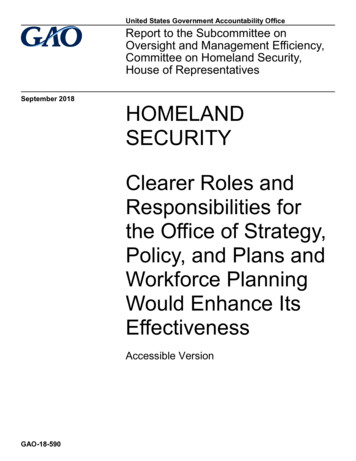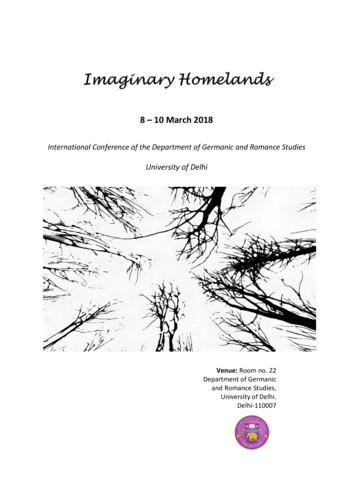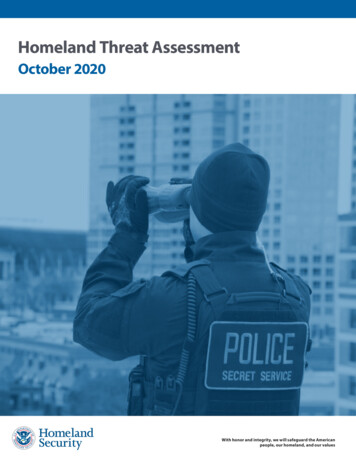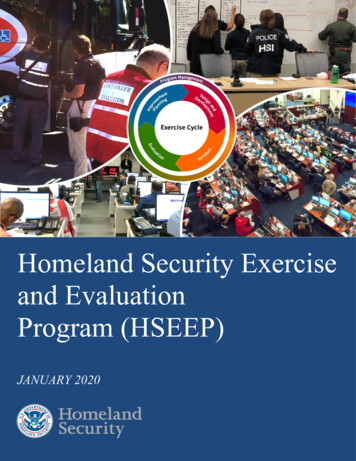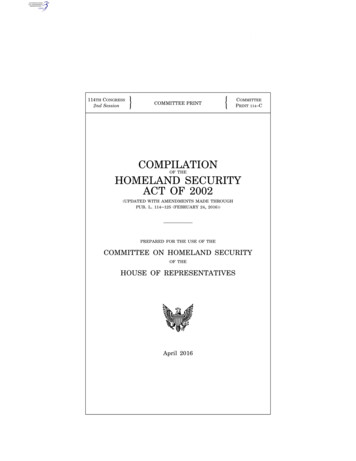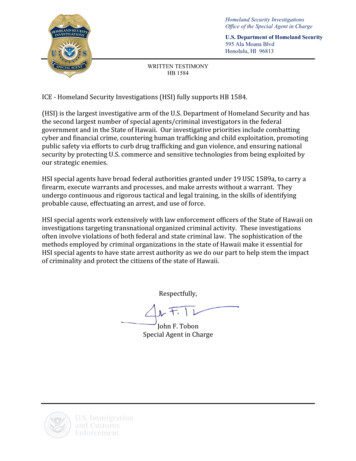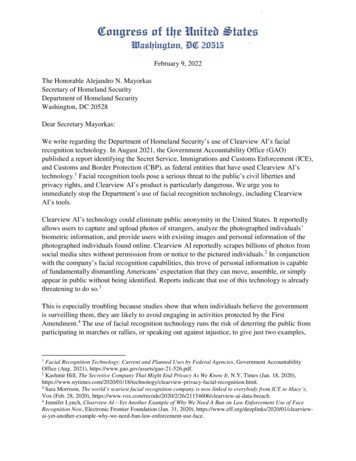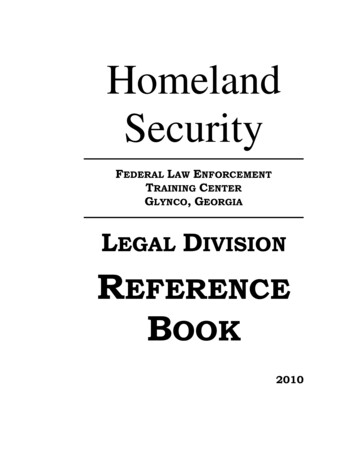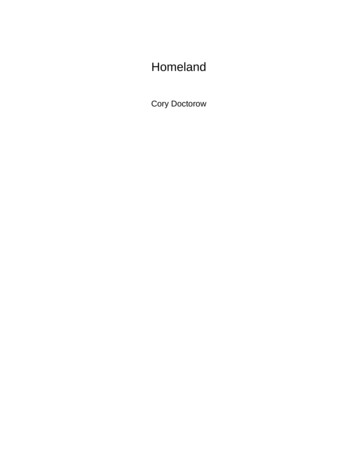
Transcription
HomelandCory Doctorow
Copyright CorDoc-Co, Ltd (UK), 2013.;License: Creative Commons Attribution-NonCommercial-NoDerivs 3.0ii
Homeland,Cory Doctorow1
Homeland[prelude]A commercial interludeAs you read through this free ebook, you'll notice that it is dotted, here and there, with appreciations of great bookstores -- storesthat I love, stores that have shown me love. As a former booksellerand a book hoarder for life, bookstores are my natural habitat. It'smy hope that as you read this, you'll (ahem) bookmark these storesfor regular visits and show them the love they deserve.I've also dotted this ebook with “commercial interludes,” in whichI shamelessly pitch the commercial editions of this book. This, afterall, is my living. It's how I feed my family. It's how I come to havethe extraordinary privilege of sitting in an office all day, making upstories and putting them down in words, which is all I ever wanted todo, since I was six years old. This being the 21st century, there isno way I can force you to pay for this book before reading it -- youcan get pretty much any ebook on the Internet for free with no moredifficulty than you'd undergo if you were to buy it through legit channels -- so I hope that by giving you this, and trusting you, that youwill reward me by helping to support me and my publisher (whosecontribution to this book can't be overstated).Now, perhaps you're thinking, “Hey, I don't really need a commercial ebook, and I don't want the print book -- can't I just say thankyou some other way?” The answer to that is a resounding yes. Aswith my other recent books, I have assembled a list of librarians,teachers, and people from other public institutions who would liketo get a free copy of Homeland for their kids and patrons. I pay anassistant, the wonderful Olga Nunes, to check out each of these people and ensure that they are who they say they are, and then we listthem here:‹http://craphound.com/homeland/donate›If you want to tip me for this book, don't send me cash. Instead,send one of those institutions a copy of this book -- buy it from yourlocal store and have it shipped, or buy it online -- and that way abunch of kids will get access to it, and I'll get the sale credited to myname, which means bigger advances, bigger publicity budgets, andmore foreign sales for me. It's a way to pay your debts forward inrealtime, and it's pretty nifty (if I do say so myself).(And I do)2
HomelandBack to buying the book. This book is published by Tor Teen,and like all Tor books, all of its ebook editions are DRM-free. Thehardcovers (and the paperbacks, when they ship) pay me a healthyroyalty, and go to support a publisher that has poured huge amountsof money and time into making my books better and bringing themto the world. In other words, they're not just good books -- they'rebooks that do good. Here's how you get yours:USA:‹Amazon Kindle› (DRM-free)‹Barnes and Noble Nook› (DRM-free)‹Google Books› (DRM-free)‹Kobo›‹Apple iBooks› (DRM-free)‹Amazon›‹Indiebound› (will locate an independent store near you!)‹Barnes and Amazon Kindle› .ca›You don't have to buy the book from an online seller, either.‹Here's a tool› that will find you independent stores in your area thathave copies on their shelves.3
HomelandRead this first!This section is dedicated to Chapters/Indigo, the national Canadian megachain. I wasworking at Bakka, the independent science fiction bookstore, when Chapters opened itsfirst store in Toronto and I knew that something big was going on right away, because twoof our smartest, best-informed customers stopped in to tell me that they'd been hired to runthe science fiction section. From the start, Chapters raised the bar on what a big corporatebookstore could be, extending its hours, adding a friendly cafe and lots of seating, installingin-store self-service terminals and stocking the most amazing variety of titles.‹Chapters/Indigo›This book is distributed under a Creative Commons Attribution-NonCommercial-NoDerivs3.0 license. That means:You are free: to Share -- to copy, distribute and transmit the workUnder the following conditions: Attribution. You must attribute the work in the manner specified by the author orlicensor (but not in any way that suggests that they endorse you or your use of thework). Noncommercial. You may not use this work for commercial purposes. No Derivative Works -- You may not alter, transform, or build upon this work.For any reuse or distribution, you must make clear to others the license terms of this work.The best way to do this is with a link ‹http://craphound.com/homeland›Any of the above conditions can be waived if you get our permissionMore info here: .0/›See the end of this file for the complete legalese.GOSH: London, EnglandLondon's GOSH doesn't even stock my books. They're strictlygraphic novels. But what a store ! They've got this absolutelychoice corner store on Berwick Street, right in the middle of Soho,amidst the dirty bookstores, brothels, vintage vinyl stores, upscaledim sum places, and rad Australian coffee-houses. The store isspacious , having successfully resisted the comic-store-manager's4
Homelandtraditional vice of piling stuff up and stacking it close to maximizethe funnybooks and tchotchkes. Instead, it has this brilliantly curated look-and-feel, dominated by huge tables full of brilliantly handpicked choices, and a basement full of oversized hardcovers andlong-boxes full of old singles. You really couldn't ask for a bettercomic store in a better location.‹GOSH: 1 Berwick St, London, W1F 0DR 44 20 7636 1011›5
HomelandThe copyright thingThe Creative Commons license at the top of this file probably tipped you off to the factthat I've got some pretty unorthodox views about copyright. Here's what I think of it, in anutshell: a little goes a long way, and more than that is too much.I like the fact that copyright lets me sell rights to my publishers and film studios and so on.It's nice that they can't just take my stuff without permission and get rich on it without cuttingme in for a piece of the action. I'm in a pretty good position when it comes to negotiatingwith these companies: I've got a great agent and a decade's experience with copyrightlaw and licensing (including a stint as a delegate at WIPO, the UN agency that makes theworld's copyright treaties). What's more, there's just not that many of these negotiations -even if I sell fifty or a hundred different editions of this book (which would put it in the topmillionth of a percentile for novels), that's still only fifty or a hundred negotiations, which Icould just about manage.I hate the fact that fans who want to do what readers have always done are expected toplay in the same system as all these hotshot agents and lawyers. It's just stupid to say thatan elementary school classroom should have to talk to a lawyer at a giant global publisherbefore they put on a play based on one of my books. It's ridiculous to say that peoplewho want to “loan” their electronic copy of my book to a friend need to get a license to doso. Loaning books has been around longer than any publisher on Earth, and it's a finething.Copyright laws are increasingly passed without democratic debate or scrutiny. In GreatBritain, where I live, Parliament recently passed the Digital Economy Act, a complex copyright law that allows corporate giants to disconnect whole families from the Internet if anyone in the house is accused (without proof) of copyright infringement; it also creates a“Great Firewall of Britain” that is used to censor any site that record companies and moviestudios don't like. This law was passed in 2010 without any serious public debate in Parliament, rushed through using a dirty process through which our elected representativesbetrayed the public to give a huge, gift-wrapped present to their corporate pals.It gets worse: around the world, rich countries like the US, the EU and Canada negotiatedsecret copyright treaties called “The Anti-Counterfeiting Trade Agreement” (ACTA) and“Trans-Pacific Partnership” (TPP) that have all the problems that the Digital Economy Acthad and then some. The plan was to agree to them in secret, without public debate,and then force the world's poorest countries to sign up for it by refusing to allow them tosell goods to rich countries unless they do. In America, the plan was to pass it withoutCongressional debate, using the executive power of the President. ACTA began underBush, but the Obama administration has pursued it with great enthusiasm, and presidedover the creation of TPP. The secret part of the plan failed -- ACTA ran into heavy oppositionin Congress and has been rejected by Mexico and the European Parliament -- but the treaty6
Homelandisn't dead yet, and has supporters on both sides of the house who keep attempting to bringit back under a new name. This is a bipartisan lunacy.So if you're not violating copyright law right now, you will be soon. And the penalties areabout to get a lot worse. As someone who relies on copyright to earn my living, this makesme sick. If the big entertainment companies set out to destroy copyright's mission, theycouldn't do any better than they're doing now. Just as this book is coming into print (February, 2013), the big American ISPs and big American entertainment companies are rollingout “six strikes” -- a voluntary plan to harass people accused, without proof, of downloading, and ultimately, to disconnect them from the net.So, basically, screw that. Or, as the singer and American folk hero Woody Guthrie soeloquently put it:“This song is Copyrighted in U.S., under Seal of Copyright #154085, for a period of28 years, and anybody caught singin' it without our permission, will be mighty goodfriends of ourn, cause we don't give a dern. Publish it. Write it. Sing it. Swing to it.Yodel it. We wrote it, that's all we wanted to do.”7
HomelandAbout derivative worksMost of my previous books have been released under a slightly different Creative Commons license, one that allowed for derivative works (that is, new creative works based onthis one). Keen observers will have already noticed that this book is licensed “NoDerivs”-- that is, you can't make remixes without permission.A word of explanation for this shift is in order. When I first started publishing under CreativeCommons licenses, I had to carefully explain this to my editor and publisher at Tor Books.They were incredibly forward-looking and gave me permission to release the first-evernovel licensed under CC -- my debut novel Down and Out in the Magic Kingdom (‹http://craphound.com/down/)›. This ground-breaking step was only possible because I was able tohave intense, personal discussions with my publisher.My foreign rights agents are the inestimable Danny and Heather Baror, and collectivelythey have sold my books into literally dozens of countries and languages, helping to bringmy work to places I couldn't have dreamed of reaching on my own. They subcontract formy agent Russell Galen, another inestimable personage without whom I would not haveattained anything like the dizzy heights that I enjoy today. They attend large book fairsin cities like Frankfurt and Bologna in order to sell the foreign rights to my books, oftennegotiating with one of a few English-speakers at a foreign press, who then goes back andjustifies her or his decisions to the rest of the company.The point is that this is nothing like my initial Creative Commons discussion with Tor. Thatwas me sitting down and making the case to editors I've known for years (my editor at Tor,Patrick Nielsen Hayden, has known me since I was 17). My foreign rights are sold by asubcontractor of my representative to a representative of a press I've often never heardof, who then has to explain my publishing philosophy to people I've never met, using alanguage I don't speak.This is hard.Danny and Heather have asked -- not demanded, asked! -- that I consider publishing booksunder a NoDerivs license, so that I can consult with them before I authorize translationsof my books. They want to be able to talk to potential foreign publishers about how thisstuff works, to give me time to talk with them, to ease them into the idea, and to have thekind of extended conversation that helped me lead Tor into their decision all those yearsago.And I agreed. Free/open culture is something publishers need to be led to, not forced into.It's a long conversation that often runs contrary to their intuition and received wisdom. Butno one gets into publishing to get rich. Working in the publishing industry is virtually a vowof poverty. The only reason to get into publishing is because you flat-out love books andwant to make them happen. People work in publishing for the same reason writers write:they can't help themselves.8
HomelandSo I want to be able to have this conversation, personally, unhurriedly, one-to-one. I wantto keep all the people involved in my books -- agents, subagents, foreign editors and theirbosses -- in the loop on these discussions. I will always passionately advocate for CClicensing in all of my work. I promise you that if you write to me with a request for anoncommercial derivative use, that I will do everything in my power to see that it is authorized.And in the meantime, I draw your attention to article 2 of all Creative Commons licenses:Nothing in this License is intended to reduce, limit, or restrict any uses free from copyright or rights arising from limitations or exceptions that are provided for in connectionwith the copyright protection under copyright law or other applicable laws.Strip away the legalese and what that says is, “Copyright gives you, the public, rights. Fairuse is real. De minimus exemptions to copyright are real. You have the right to makeall sorts of uses of all copyrighted works, without permission, without Creative Commonslicenses.Rights are like muscles. When you don't exercise them, they get flabby. Stop asking forstuff you can take without permission. Please!Pandemonium: Cambridge, MassAs you might expect, a town like Cambridge, Mass, is full ofamazing nerdware purveyors. When you're in spitting distance ofboth MIT and Harvard, there is a hell of a built-in market for CoolStuff. But sitting atop the mountain of geeky stores is PandemoniumBooks, a comics/RPG/book store right on Mass Ave (they used to bein The Garage in Harvard Square, and their departure has left a hugehole in that space). There is practically nothing I like better than tostart a walk at MIT (possibly with a stop at the MIT bookstore) and upMass Ave, to Harvard, with a long, lingering stop at Pandemonium.There's always something going on there -- someone playing a tabletop game, trading Magic cards, or just talking animatedly about thekind of books I love.‹Pandemonium: 4 Pleasant St, Cambridge, MA 02139 1 617547 3721›9
HomelandDonations and a word to teachers and librariansEvery time I put a book online for free, I get emails from readers who want to send medonations for the book. I appreciate their generous spirit, but I'm not interested in cash donations, because my publishers are really important to me. They contribute immeasurablyto the book, improving it, introducing it to audiences I could never reach, helping me domore with my work. I have no desire to cut them out of the loop.But there has to be some good way to turn that generosity to good use, and I think I'vefound it.Here's the deal: there are lots of teachers and librarians who'd love to get hard-copiesof this book into their kids' hands, but don't have the budget for it (teachers in the USspend around 1,200 out of pocket each on classroom supplies that their budgets won'tstretch to cover, which is why I sponsored a classroom at Ivanhoe Elementary in my oldneighborhood in Los Angeles; you can adopt a class yourself at ‹http://www.adoptaclassroom.org/›.There are generous people who want to send some cash my way to thank me for the freeebooks.I'm proposing that we put them together.If you're a teacher or librarian and you want a free copy of Homeland, email ‹freehomelandbook@gmail.com› with your name and the name and address of your school. It'll be posted to ‹http://craphound.com/homeland/donate/› by my fantastic helper, Olga Nunes, so that potential donors cansee it.If you enjoyed the electronic edition of Homeland and you want to donate something tosay thanks, go to ‹http://craphound.com/homeland/donate/› and find a teacher or librarian you wantto support. Then go to Amazon, BN.com, or your favorite electronic bookseller and ordera copy to the classroom, then email a copy of the receipt (feel free to delete your addressand other personal info first!) to ‹freehomelandbook@gmail.com› so that Olga can mark that copy assent. If you don't want to be publicly acknowledged for your generosity, let us know andwe'll keep you anonymous, otherwise we'll thank you on the donate page.I've done this with a ton of books now, and gotten thousands of books into the hands ofreaders through your generosity. I am more grateful than words can express for this -- oneof my readers called it “paying your debts forward with instant gratification.” That's a heckof a thing, isn't it?10
HomelandDedicationFor Alice and Poesy, who make me whole.The second commercial interludeMe again. That's all the forematter. I admit that there's rathera lot of it. You're not obliged to read it all (though I think it's prettycool, especially ‹the part about buying copies to give to schools andlibaries› ).And you're not obliged to read this interlude, nor the ones thatfollow. I've been giving away free ebooks for nearly a decade now,and my readers have rewarded my generosity with generosity of theirown. I've had a pair of New York Times bestsellers, quit my dayjob, and now I write full time. And I'm still giving away ebooks, andtrusting that you, the reader, will reciprocate. You can either buy abook or ebook (always, always, always DRM-free) from one of thebig online sellers, or ‹buy a copy from a local bookseller› .USA:‹Amazon Kindle› (DRM-free)‹Barnes and Noble Nook› (DRM-free)‹Google Books› (DRM-free)‹Kobo›‹Apple iBooks› (DRM-free)‹Amazon›‹Indiebound› (will locate an independent store near you!)‹Barnes and Amazon Kindle› .ca›BakkaPhoenix: Toronto, Canada11
HomelandThis chapter is dedicated to BakkaPhoenix Books in Toronto,Canada. Bakka is the oldest science fiction bookstore in the world,and it made me the mutant I am today. I wandered in for the first timearound the age of 10 and asked for some recommendations. TanyaHuff (yes, the Tanya Huff, but she wasn't a famous writer back then!)took me back into the used section and pressed a copy of H. BeamPiper's “Little Fuzzy” into my hands, and changed my life forever. Bythe time I was 18, I was working at Bakka -- I took over from Tanyawhen she retired to write full time -- and I learned life-long lessonsabout how and why people buy books. I think every writer shouldwork at a bookstore (and plenty of writers have worked at Bakkaover the years! For the 30th anniversary of the store, they put together an anthology of stories by Bakka writers that included workby Michelle Sagara (AKA Michelle West), Tanya Huff, Nalo Hopkinson, Tara Tallan --and me!)‹BakkaPhoenix Books: 84 Harbord Street, Toronto, Canada M5S1G5, 1 416 963 9993›12
HomelandChapter 1.Attending Burning Man made me simultaneously one of the most photographed people onthe planet and one of the least surveilled humans in the modern world.I adjusted my burnoose, covering up my nose and mouth and tucking its edge into placeunder the lower rim of my big, scratched goggles. The sun was high, the temperaturewell over a hundred degrees, and breathing through the embroidered cotton scarf madeit even more stifling. But the wind had just kicked up, and there was a lot of playa dust-- fine gypsum sand, deceptively soft and powdery, but alkali enough to make your eyesburn and your skin crack -- and after two days in the desert, I had learned that it was betterto be hot than to choke.Pretty much everyone was holding a camera of some kind -- mostly phones, of course,but also big SLRs and even old-fashioned film cameras, including a genuine antique platecamera whose operator hid out from the dust under a huge black cloth that made me hotjust to look at it. Everything was ruggedized for the fine, blowing dust, mostly through thesimple expedient of sticking it in a zip-lock bag, which is what I'd done with my phone. Iturned around slowly to get a panorama and saw that the man walking past me was holdingthe string for a gigantic helium balloon a hundred yards overhead, from which dangled adigital video camera. Also, the man holding the balloon was naked.Well, not entirely. He was wearing shoes. I understood that: playa dust is hard on yourfeet. They call it playa-foot, when the alkali dust dries out your skin so much that it startsto crack and peel. Everyone agrees that playa-foot sucks.Burning Man is a festival held every Labor Day weekend in the middle of Nevada's BlackRock desert. Fifty thousand people show up in this incredibly harsh, hot, dusty environment, and build a huge city -- Black Rock City -- and participate. “Spectator” is a viciousinsult in Black Rock City. Everyone's supposed to be doing stuff and yeah, also admiringeveryone else's stuff (hence all the cameras). At Burning Man, everyone is the show.I wasn't naked, but the parts of me that were showing were decorated with elaborate mandalas laid on with colored zinc. A lady as old as my mother, wearing a tie-dyed weddingdress, had offered to paint me that morning, and she'd done a great job. That's anotherthing about Burning Man: it runs on a gift economy, which means that you generally goaround offering nice things to strangers a lot, which makes for a surprisingly pleasant environment. The designs the painter had laid down made me look amazing, and therewere plenty of cameras aiming my way as I ambled across the open desert toward NineO'Clock.Black Rock City is a pretty modern city: it has public sanitation (portable chem-toiletsdecorated with raunchy poems reminding you not to put anything but toilet paper in them),electricity and Internet service (at Six O'Clock, the main plaza in the middle of the ringshaped city), something like a government (the nonprofit that runs Burning Man), several13
Homelandlocal newspapers (all of them doing better than the newspapers in the real world!), a dozenradio stations, an all-volunteer police force (the Black Rock Rangers, who patrolled wearingtutus or parts of chicken suits or glitter paint), and many other amenities associated withthe modern world.But BRC has no official surveillance. There are no CCTVs, no checkpoints -- at least notafter the main gate, where tickets are collected -- no ID checks at all, no bag-searches,no RFID sniffers, no mobile phone companies logging your movements. There was alsono mobile phone service. No one drives -- except for the weird art cars registered with theDepartment of Mutant Vehicles -- so there were no license plate cameras and no sniffersfor your E-Z Passes. The WiFi was open and unlogged. Attendees at Burning Man agreednot to use their photos commercially without permission, and it was generally consideredpolite to ask people before taking their portraits.So there I was, having my picture taken through the blowing dust as I gulped down water from the water-jug I kept clipped to my belt at all times, sucking at the stubby built-instraw under cover of the blue-and-silver burnoose, simultaneously observed and observer,simultaneously observed and unsurveilled, and it was glorious.“Wahoo!” I shouted to the dust and the art cars and the naked people and the enormouswooden splay-armed effigy perched atop a pyramid straight ahead of me in the middle ofthe desert. This was The Man, and we'd burn him in three nights, and that's why it wascalled Burning Man. I couldn't wait.“You're in a good mood,” a jawa said from behind me. Even with the tone-shifter built intoits dust-mask, the cloaked sand-person had an awfully familiar voice.“Ange?” I said. We'd been missing each other all that day, ever since I'd woken up anhour before her and snuck out of the tent to catch the sunrise (which was awesome), andwe'd been leaving each other notes back at camp all day about where we were headingnext. Ange had spent the summer spinning up the jawa robes, working with cooling towelsthat trapped sweat as it evaporated, channeling it back over her skin for extra evaporativecooling. She'd hand-dyed it a mottled brown, tailored it into the characteristic monkish robeshape, and added crossed bandoliers. These exaggerated her breasts, which made thewhole thing entirely and totally warsome. She hadn't worn it out in public yet, and now,in the dust and the glare, she was undoubtedly the greatest sand-person I'd ever met. Ihugged her and she hugged me back so hard it knocked the wind out of me, one of hertrademarked wrestling-hold cuddles.“I smudged your paint,” she said through the voice-shifter after we unclinched.“I got zinc on your robes,” I said.She shrugged. “Like it matters! We both look fabulous. Now, what have you seen andwhat have you done and where have you been, young man?”14
Homeland“Where to start?” I said. I'd been wandering up and down the radial avenues that cutthrough the city, lined with big camps sporting odd exhibits -- one camp where a line ofpeople were efficiently making snow cones for anyone who wanted them, working withhuge blocks of ice and a vicious ice-shaver. Then a camp where someone had set up atall, linoleum-covered slide that you could toboggan down on a plastic magic carpet, afterfirst dumping a gallon of waste water over the lino to make it plenty slippery. It was a veryclever way to get rid of grey water (that's water that you've showered in, or used to washyour dishes or hands -- black water being water that's got poo or pee in it). One of theother Burning Man rules was “leave no trace” -- when we left, we'd take every scrap ofBlack Rock City with us, and that included all the grey water. But the slide made for agreat grey water evaporator, and every drop of liquid that the sliders helped turn into vaporwas a drop of liquid the camp wouldn't have to pack all the way back to Reno.There'd been pervy camps where they were teaching couples to tie each other up; a “junkfood glory hole” that you put your mouth over in order to receive a mysterious and unhealthy treat (I'd gotten a mouthful of some kind of super-sugary breakfast cereal studdedwith coconut “marshmallows” shaped like astrological symbols); a camp where they wereoffering free service for playa bikes (beater bikes caked with playa dust and decorated withglitter and fun fur and weird fetishes and bells); a tea-house camp where I'd been givena very precisely made cup of some kind of Japanese tea I'd never heard of that was delicious and sharp; camps full of whimsy; camps full of physics; camps full of optical illusions;camps full of men and women; a kids' camp full of screaming kids running around playingsome kind of semi-supervised outdoor game -- things I'd never suspected existed.And I'd only seen a tiny slice of Black Rock City.I told Ange about as much as I could remember and she nodded or said “ooh,” or “aah,” ordemanded to know where I'd seen things. Then she told me about the stuff she'd seen -a camp where topless women were painting one others' breasts, a camp where an entirebrass band was performing, a camp where they'd built a medieval trebuchet that firedancient, broken-down pianos down a firing range, the audience holding its breath in totalsilence while they waited for the glorious crash each piano made when it exploded intoflinders on the hardpack desert.“Can you believe this place?” Ange said, jumping up and down on the spot in excitement,making her bandoliers jingle.“I know -- can you believe we almost didn't make it?”I'd always sort of planned on going out to see The Man burn -- after all, I grew up in SanFrancisco, the place with the largest concentration of burners in the world. But it took a lotof work to participate in Burning Man. First, there was the matter of packing for a campingtrip in the middle of the desert where you had to pack in everything -- including water -and then pack it all out again, everything you didn't leave behind in the porta-potties. Andthere were very strict rules about what could go in those. Then there was the gift economy:15
Homelandfiguring out what I could bring to the desert that someone else might want. Plus the matterof costumes, cool art and inventions to show off. Every time I started to think about it, Ijust about had a nervous breakdown.But this year, of all years, I'd made it. This was the year both my parents lost their jobs.The year I'd dropped out of college rather than take on any more student debt. The yearI'd spent knocking on every door I could find, looking for paid work -- anything! -- withoutgetting even a nibble.“Never underestimate the determination of a kid who is cash-poor and time-rich,” Angesaid solemnly, pulling down her face mask with one hand and yanking me down to kiss mewith the other.“That's catchy,” I said. “You should print T-shirts.”“Oh,” she said. “That reminds me. I got a T-shirt!”She threw open her robe to reveal a proud red tee that read MAKE BEAUTIFUL ART ANDSET IT ON FIRE, laid out like those British “Keep Calm and Carry On” posters, with theBurning Man logo where the crown should be.“Just in time, too,” I said, holding my nose. I was only partly kidding. At the last minute, we'dboth decided to ditch half the clothes we'd planned on bringing so that we could fit moreparts for Secret Project
Homeland whokeepattemptingtobring
